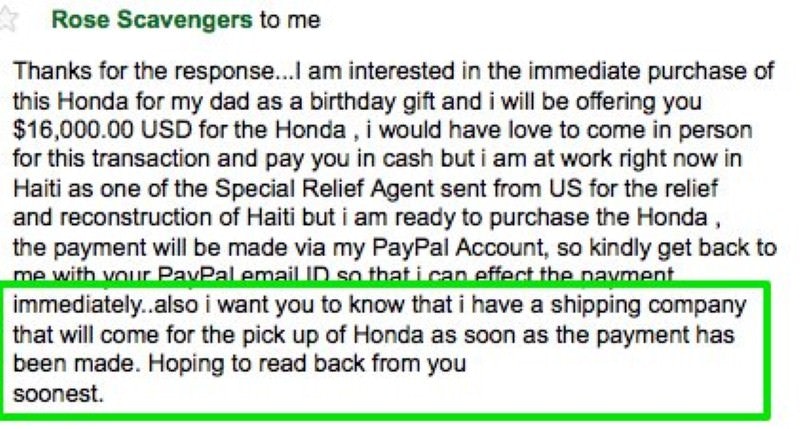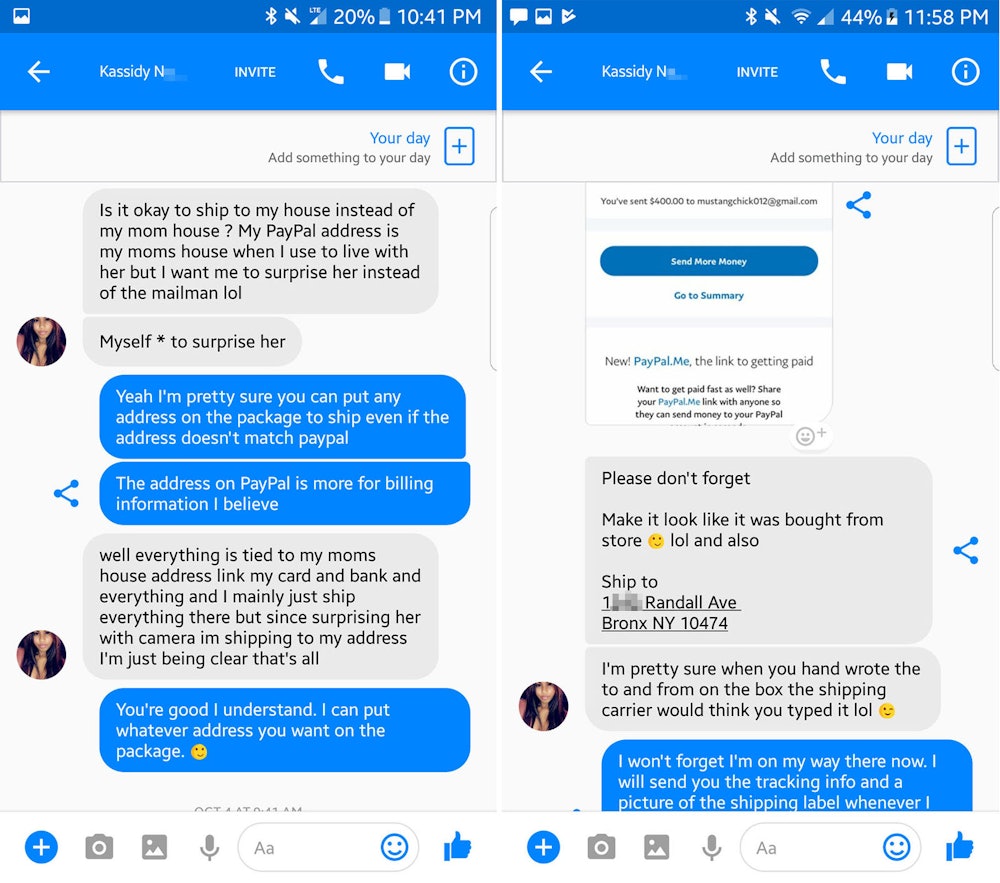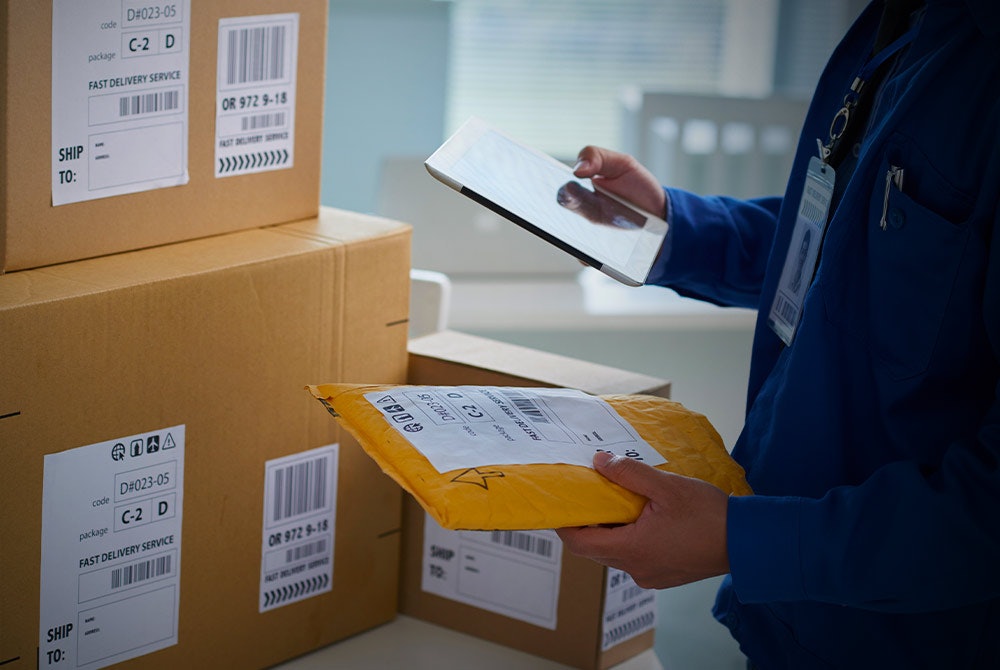- How PayPal Shipping Scams Work
- How to Beat PayPal Shipping Scams
- Red Flags of PayPal Shipping Scams
- Have You Fallen For This Scam?
- Frequently Asked Questions
PayPal shipping scams can be avoided as long as you use best practices when selling items and always be on the lookout for red flags of a scam. The most important thing to remember is never to use a prepaid shipping label that the seller provides, even if it means you don't have to pay for shipping.
How PayPal Shipping Scams Work
There are many different versions of PayPal shipping scams, most of which involve a fraudulent buyer scamming you out of your item/s for sale. Here are how these scams work.
The Buyer Asks You to Use Their Shipping Account
In this scam, the buyer typically promises you a discount on shipping costs because they can ship items at a discounted rate. They may claim they have a long-term relationship with the vendor or shipping service that is more reliable or cheaper.

Alternatively, the buyer may ask that you use the prepaid shipping label they will provide.
Soon after you send the item using the buyer's shipping company or prepaid label, the buyer calls the shipping company and asks them to send it to a different address. Sometimes, scammers will ask you to send it to a different address, offering a story or reason why their address in PayPal is different from the address they want you to ship the item to.

Then the buyer files a claim with PayPal saying that you never shipped the item. Even though you may claim you did, there's no way to prove your case because the buyer never received the item. Then the buyer can win the case and get a refund for the money.
Not Everyone Can Be Trusted
Although it may seem like a nice gesture when the buyer offers to provide you with a shipping label, this is a sign of a scam. If the buyer bought the label, they can also reroute the delivery, claim the delivery never arrived, and claim a refund from PayPal.
The Buyer Asks You to Wire Money Directly to the Shipping Company
The buyer says you have to wire money directly to the shipper or a shipping agent to get a better shipping rate. However, the account to which you send the money belongs to the buyer or one of the buyer's associates. Therefore, the fraudulent buyer gets the money.
Further, once you have sent the money to the fake shipping company, you may find that the buyer placed the order using a stolen bank account or credit card. If this is the case, as the seller, you may have to give the money back to the owner of the stolen credit card or bank account.
The Buyer Sends You Real Money but from a Different PayPal Account
Sometimes, people can steal someone's PayPal login credentials and use their accounts to purchase items. In this scam, you put an item up for sale, a buyer wins it, and then you get paid. You get real money in your account. You then see the money in your account and feel comfortable shipping the item you listed.
However, after you send the item, you learn the account belonged to someone else. Because the money came from an account the buyer hijacked, you may be required to return the money. In the meantime, the buyer has the item, and they can sell it for a profit.
How to Beat PayPal Shipping Scams
Although there are different versions of PayPal shipping scams, there are some best practices to follow to ensure you don't fall for them:
- Only use a shipping company you're comfortable with and trust, such as UPS and FedEx.
- Don't accept a prepaid label from a buyer.
- Confirm payment has been made by logging into your PayPal account.
- Only ship items to the address you see on the "Transaction Details" page within PayPal.
- Don't allow the buyer to organize shipment—do it from your end.
Red Flags of PayPal Shipping Scams
There are several red flags for PayPal shipping scams, and any one of them may mean someone is trying to scam you. You should be careful if anyone says they want you to use a specific shipping service. It may not be legitimate. Even if the service is genuine, the buyer could call the shipping company and have the order sent to a different address.
If the buyer asks that you use a prepaid label, you should beware. They might have bought the labels using a stolen credit card. Also, if the buyer gives you a fake or incorrect shipping address, this is another red flag. They could then reach out to the shipping company, change the destination address, and claim they never got the item they paid for.
Here are some other common red flags to look out for:
- Poor grammar or spelling
- Links that lead to the wrong place
- Correspondence from non-PayPal emails
Have You Fallen For This Scam?
If you've fallen for a PayPal shipping scam, you should first reach out to PayPal. You can do this by going to their Resolution Center and clicking "Report a Problem." After you contact them, they will then launch an investigation. During the investigation, they will collect all digital documents about the transaction.
Keep any emails sent between you and the buyer and anyone else, including any third-party shipping agents involved. In many cases of fraud, PayPal will compensate you. PayPal has a seller protection program that covers sellers who have been the targets of PayPal scams; however, you must meet the requirements to receive compensation.
It's important to verify links and contact details to beat imposters.
Report the Scam to the Authorities
Once you've filed a PayPal complaint, you should also contact the Federal Trade Commission (FTC). The FTC investigates, logs, and follows up on these shipping scams. They may use the information you provide to track down the scammer and prosecute them. While PayPal, in many situations, may give you back any money you've lost, contacting the FTC can help prevent others from getting scammed in the same way.
For similar reasons, you should also reach out to your local police. Thefts, including digital ones, fall under their jurisdiction. In addition to investigating the situation, they can collect information about your case and use it to identify the activities of thieves who follow similar patterns. In this way, you can help protect others from getting scammed.


Comments